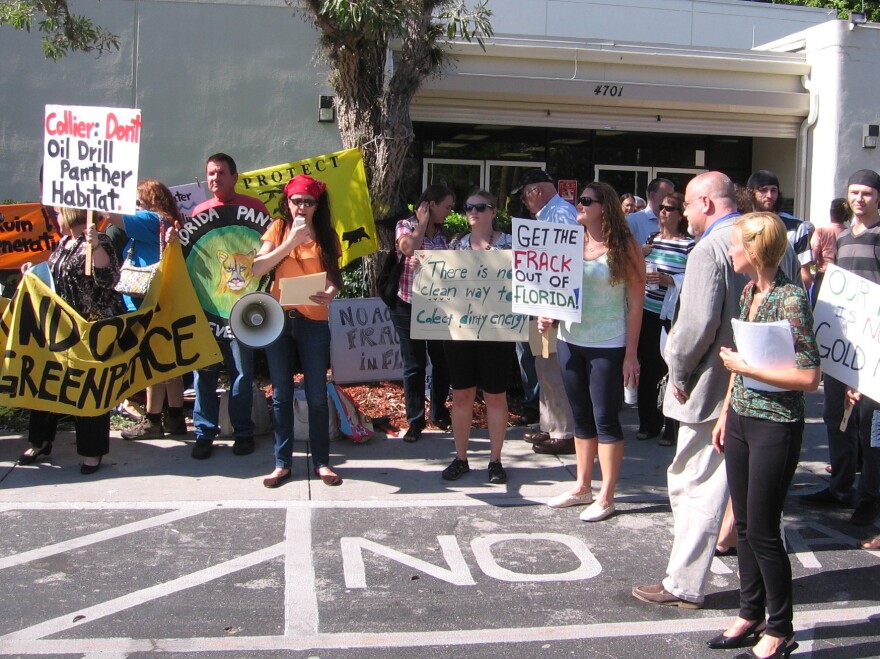As oil production goes, Florida isn't much of a player. The state produced less than 2 million barrels last year, which is how much oil Texas pumps from its wells each day.
That's about to change as the revolution in oil drilling technology comes to Florida.
One of the areas targeted for oil drilling is at Jaime Duran's doorstep in the southwestern part of the state. A retired engineer, Duran lives in a cottage with his wife, Pamela, and the chickens they raise on a 5-acre plot. Last year, the Durans were surprised when a man came by with information about a plot of land just 1,300 feet from their house.
"He said he wasn't supposed to tell us a lot of things," Jaime Duran says. "But he says, basically, they're putting an oil well there."
The man was from a company hired by the driller. He delivered a letter that warned residents that they were in an evacuation zone, and of the possibility of a release of toxic hydrogen sulfide gas. Duran and his wife began doing research and asking questions.
The more they learned, the more alarmed they became, Duran says.
"Our biggest concern is not the hydrogen sulfide," he says. "Our biggest concern is the brine, the produced waters. Every gallon of oil that they extract, they will get 20 gallons of salt water. And that salt water is toxic."
A Texas company has already received permission from the state to drill an exploratory well on the land. The Dan A. Hughes Co. is now seeking permission for an injection well that would accommodate the millions of gallons of toxic brine produced in the drilling process.

Residents and environmental groups strongly oppose the plan. At a community center in Naples, state and federal officials recently held hearings to take public comments on the proposed well. Outside, activists rallied and chanted, calling on the EPA to deny the permit for an injection well, and for state authorities to reverse their decision allowing exploratory drilling.
A residents' group called Preserve Our Paradise has already filed a legal challenge. With just one road serving a large community, the current evacuation plan would not be adequate if there's an explosion, spill or toxic gas release, the group says.
Matthew Schwartz, director of the South Florida Wildlands Association, has environmental concerns. The well would be in the heart of the western Everglades, an area more diverse than Everglades National Park.
"It's not just saw grass. It's got this tremendous diversity," Schwartz says. "It is the last holdout for the Florida panther."
Florida's state animal is one of the most endangered species in America, with no more than 160 still left in the wild. With declining habitat, the panther's outlook already isn't good. Schwartz worries that mounting a major industrial operation will drive them out of the area.
But Florida's fish and wildlife commission disagrees. At the hearing, Darrell Land, a state panther specialist, said he saw no reason why the drilling would pose a problem.
"Panthers have utilized areas where active oil extraction is going on, and they've been doing that for 30 to 40 years," Land says. "We also know that panthers have learned to coexist with all kinds of disruption."
His comments, along with those of other state officials, were met with jeers and boos from the audience.
So far, state and federal officials haven't indicated that they see anything to stop the permit applications from being approved.
With new drilling technology, even long-neglected oil fields, such as those in Florida, can now be made productive. Oil companies have applied for 15 new drilling permits within the past year in Florida, and more are likely coming.
David Mica, the head of the Florida Petroleum Council, says with new techniques of directional drilling, companies can search for oil in sensitive areas with minimal surface disturbances.
"It's really the sort of thing that those that are concerned about our environment should be cheering for," Mica says.
The Dan A. Hughes Co. says it has no plans at this point to use fracking in Florida. But skeptical drilling opponents say that if the company changes its mind, Florida's rules do allow it to begin fracking in the Everglades after notifying state regulators.
Copyright 2021 NPR. To see more, visit https://www.npr.org.



